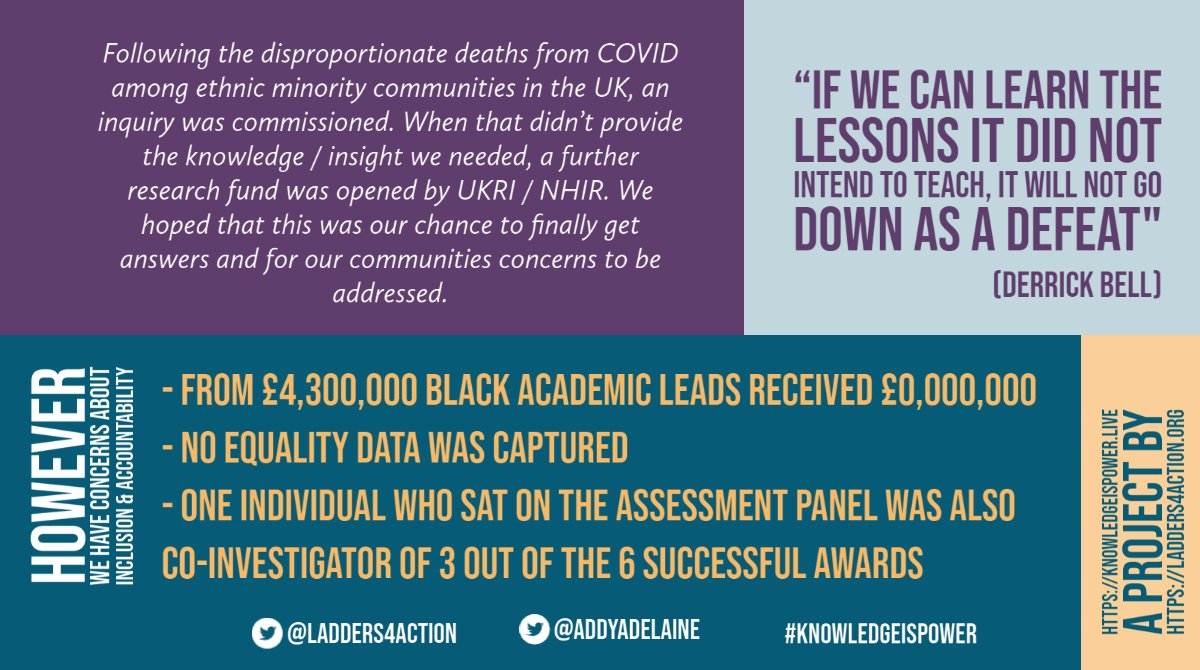1/24) I care about research ethics, the past week has been particularly anxiety fueled. Myself and many others have been trying to encourage greater accountability and equality in research, but we seem to be going backwards. Here& #39;s a reminder of what I am trying to highlight
2/24) I& #39;ve been talking to @zaranosaur about her experience of trying to talk to @UKRI to highlight the marginalisation of disabled academics and research on disability. https://twitter.com/zaranosaur/status/1306913778941014016?s=20">https://twitter.com/zaranosau...
3/24) I saw today that the research council NERC awarded 0 of its fellowships to women. Again highlighting an inherent challenge within the research council and their research / funding systems and processes https://twitter.com/KorichevaLab/status/1308017824460402690?s=20">https://twitter.com/Koricheva...
4/24) This was in the same week that the government announced it& #39;s approach to research, which removed the (NIHR) criteria for progress against the gender equality quality mark (athena swan) to be considered in research funding allocation. #uk-research-and-innovation-and-beis">https://www.gov.uk/government/publications/reducing-bureaucratic-burdens-higher-education/reducing-bureaucratic-burdens-on-research-innovation-and-higher-education #uk-research-and-innovation-and-beis">https://www.gov.uk/governmen...
5/24) Rather then improving or enhancing accountability systems the government seems set to push ahead in it& #39;s attempt to reduce barriers to research - barriers for researchers gaining funding, barriers to access data / genetic data & barriers to working with private companies.
6/24) I personally believe that the recent changes in approach to how we do research in the UK have not been adequately discussed. Most people I talk to aren& #39;t even aware of what& #39;s happening. I feel there seems to be a push towards genetic research & research with private comps.
7/24) The Public Health England Inquiry on COVID & BAME communities clearly demonstrated that BAME individuals felt that there was more need to research systemic discrimination and inequality as they felt this increased their exposure to COVID. https://www.gov.uk/government/publications/covid-19-understanding-the-impact-on-bame-communities">https://www.gov.uk/governmen...
8/24) However, If you look at the UKRI COVID & BAME funding awards you& #39;ll see that many awardees knew Prof. Khunti. (the person who sat on the assessment panel and who was co-investigator in 3 out of 6 awards). You will also see a strong genetics focus & links to UK Biobank.
9/24) Prof Treweek was awarded £15K to look at the factors that may reduce the inclusion of BAME participants in clinical COVID trials. He had previously studied attitudes of members of the public regarding repositories of genetic information& DNA biobanks.
10/24) Prof Treweek had written with Prof. Khunti on a paper entitled - COVID-19 and ethnicity: who will research results apply to? https://abdn.pure.elsevier.com/en/publications/covid-19-and-ethnicity-who-will-research-results-apply-to">https://abdn.pure.elsevier.com/en/public...
11/24) Prof. Yates was awarded £126K to explore ethnicity, COVID-19, health status and lifestyle behaviours in a study which utilses UK Biobank data and statistical modelling
12/24) Prof. Yates has written several papers with Prof. Khunti. They include - a study on obesity and the risk of COVID-19 across ethnic minority groups: Analysis of UK BioBank https://www.primary-care-diabetes.com/article/S1751-9918(20)30196-0/fulltext">https://www.primary-care-diabetes.com/article/S...
12/24) Prof. Hippisley & Dr. Dambha-Miller were awarded £327K to explore the risk & COVID-19 in individual ethnicity groups. The team will combine over 40 million patient GP records to create one of the largest COVID-19 cohorts in the UK. https://www.ukri.org/news/multimillion-investment-to-investigate-covid-19-and-ethnicity/">https://www.ukri.org/news/mult...
13/24) Prof Hippisley wrote a paper with Prof Khunti entitled - Validating risk prediction equations for common cancers as possible tools to direct risk-adapted screening and prevention: a cohort study using the UK Biobank https://www.ukbiobank.ac.uk/2018/09/validating-risk-prediction-equations-for-common-cancers-as-possible-tools-to-direct-risk-adapted-screening-and-prevention-a-cohort-study-using-the-uk-biobank/">https://www.ukbiobank.ac.uk/2018/09/v...
14/24) Dr. Dambha-Miller also wrote a paper with Prof. Khunti COVID-19 mortality: a complex interplay of sex, gender and ethnicity https://academic.oup.com/eurpub/advance-article/doi/10.1093/eurpub/ckaa150/5879989">https://academic.oup.com/eurpub/ad...
15/24) Dr. Prareek will get £2.1M to calculate the risk of contracting and dying from COVID-19 for ethnic minority healthcare workers, with access to over two million healthcare records & data from UK Biobank datasets.
16/24) Dr. Prareek has written several papers with Pro. Khunti. Including this paper entitled - Ethnicity and COVID-19: an urgent public health research priority. https://www.ncbi.nlm.nih.gov/pmc/articles/PMC7173801/">https://www.ncbi.nlm.nih.gov/pmc/artic...
17/24) Dr. Aldridge received £1.4M to better understand the impact of COVID-19 on minority ethnic and migrant groups and how to tackle it in community settings. In collaboration with Public Health England, they will link this with data on COVID-19 diagnosis and hospitalization
18/24) Dr. Aldridge is an associated researcher at Health Data UK where Prof. Khunti is also an associated researcher. Established in February 2019 by Health Data Research UK with 10 founding members, which included UK Biobank. https://www.hdruk.ac.uk/people/dr-robert-aldridge/">https://www.hdruk.ac.uk/people/dr...
19/24) I& #39;m not saying that anyone was not worthy of funding, or that anything was done against the rules. However, the closed loops we see and the focus on one interest area/methodological approach indicates an inherent bias in the systems and processes. This is not inclusive.
20/24) As UKRI funding is set to increase to £22 Billion we must remember the funding comes from the public taxes & will affect the lives of the UK public through the research it commissions. This is a matter of life and death when it comes to COVID! https://www.timeshighereducation.com/news/budget-2020-uk-research-spending-hit-ps22billion-2024-25">https://www.timeshighereducation.com/news/budg...
21/24) As we exit Europe & as Public Health England disbands to make way for the National Institute for Health Protection, researchers must be alert to how new relationships between orgs such as UK Biobank & private companies might influence research https://www.theguardian.com/society/2020/aug/17/dido-harding-to-run-agency-to-replace-public-health-englandresearchers">https://www.theguardian.com/society/2...
As calls grow for moonshot testing & extensions to the Coronavirus Act (partly to keep DNA for longer) Researcher& #39;s in all their diversity, should be part of co-creating inclusive, ethical and accountable research systems & processes for this dynamic time https://www.gov.uk/government/news/biometrics-commissioner-statement-on-the-coronavirus-act-and-the-protection-of-freedoms-act">https://www.gov.uk/governmen...
23/24) #KnowledgeIsPower Research affects policy and policy affects our lives - Black, BAME, disabled, female and LGBT+ academics must be part in shaping the future of research. We understand research ethics and the needs / research interests of our communities.
24/24) For more information and updates follow me on twitter and follow my blog. @ladders4action is a small non-profit organisation. If you can afford to make a donation to support this work it would be much appreciated. You will see the button the https://ladders4action.org"> https://ladders4action.org
https://ladders4action.org/donate/ ">https://ladders4action.org/donate/&q...

 Read on Twitter
Read on Twitter


